Desperate Hours (1990)
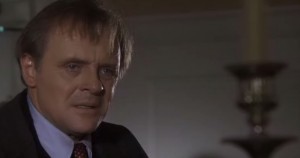
Michael Cimino’s Desperate Hours is the kind of utterly pointless remake that turns into a scientific experiment for the viewer. It brings to mind Gus Van Sant’s remake of Alfred Hitchcock’s Psycho.
Van Sant’s film is at least a compare and contrast situation, where most of the movie is identical to the original and the fun is in the technical details and the minor differences between the two (and a terrific examination regarding the way we react to color vs. black and white). Psycho is amusing because it is made for such a small audience. I’m not even sure Van Sant was interested in making the movie any good (it isn’t). He was probably just toying with the idea of homage vs. rip-off, and those looking for legitimate entertainment will come away annoyed and confused, missing the inherent humor of an Indie director (My Own Private Idaho, Drugstore Cowboy) using his recently achieved mainstream clout (Good Will Hunting) to deliberately waste money from the system that never would have been willing to support his very personal films that gave him a name in the first place.
The best way to get back at the moneymen was to make something with no purpose. Something that doesn’t just steal from an older film (and one that the younger demographic would reject simply based on its age and its lack of color scheme), but copies it note for note, showing the studios how inferior their new way of doing things is, and rubbing their nose in disrespect of the past.
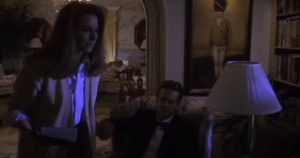 Cimino, however, had no such honorable and sneaky intentions with Desperate Hours. Rightfully treated as a pariah after the studio-destroying disaster of Heaven’s Gate, Cimino admittedly had been making what had been offered him, instead of what he wanted (imagining Footloose, which he quit early on in production, in Cimino’s style is simply mind-boggling). This resulted in long gestation periods and half-baked and overheated productions, like Year of the Dragon and The Sicilian (which, based on his lack of power, was taken out of Cimino’s hands and drastically re-edited). It should have been no surprise that his next option, Desperate Hours, was an update of the heavily dated and stagey William Wyler/Humphrey Bogart 1955 original.
Cimino, however, had no such honorable and sneaky intentions with Desperate Hours. Rightfully treated as a pariah after the studio-destroying disaster of Heaven’s Gate, Cimino admittedly had been making what had been offered him, instead of what he wanted (imagining Footloose, which he quit early on in production, in Cimino’s style is simply mind-boggling). This resulted in long gestation periods and half-baked and overheated productions, like Year of the Dragon and The Sicilian (which, based on his lack of power, was taken out of Cimino’s hands and drastically re-edited). It should have been no surprise that his next option, Desperate Hours, was an update of the heavily dated and stagey William Wyler/Humphrey Bogart 1955 original.
What’s odd is that Cimino updated the wrong elements and left the worst elements as they were. Desperate Hours is a very small play, and Wyler’s original is equally small, if preposterous. The plot doesn’t make much sense under scrutiny; Bogart escapes prison with the help of his brother and a dopey accomplice, and then they find a quiet house in the suburbs where they plan to hide out while they wait for Bogart’s girlfriend to arrive. The problem for them is that there’s a family in the house that the crew will now have to hold hostage. The original Desperate Hours is a character piece dealing with the conflict between Bogart and the father of the household, and the details of the crimes are secondary to the tension between the two leads.
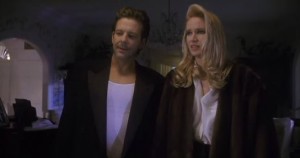 Cimino’s decision was to change the focus in the remake from the conflict to the plot, which has a central flaw so big (among many other story holes), that it defeats the movie from the start. In this version, Kelly Lynch plays a lawyer who is involved with and defending a brilliant, dangerous man (Bogart’s role is played by Mickey Rourke), and helps him escape, and he’s picked up by his brother and friend. At that point they switch cars and go hide out at the family’s house and wait for Lynch. Fundamentally, this makes no sense. Why are they waiting there in the first place? Why not just go over the border and have Lynch meet up with them at some point in the future? Not that Lynch and Rourke’s relationship is believable anyway; she seems afraid of him even when they’re supposed to be in a romantic clinch. Cimino even confounds us and embarrasses Lynch by having her show her breasts twice in the most gratuitous way possible. Neither is in a potential sexual situation, just random forced disrobing.
Cimino’s decision was to change the focus in the remake from the conflict to the plot, which has a central flaw so big (among many other story holes), that it defeats the movie from the start. In this version, Kelly Lynch plays a lawyer who is involved with and defending a brilliant, dangerous man (Bogart’s role is played by Mickey Rourke), and helps him escape, and he’s picked up by his brother and friend. At that point they switch cars and go hide out at the family’s house and wait for Lynch. Fundamentally, this makes no sense. Why are they waiting there in the first place? Why not just go over the border and have Lynch meet up with them at some point in the future? Not that Lynch and Rourke’s relationship is believable anyway; she seems afraid of him even when they’re supposed to be in a romantic clinch. Cimino even confounds us and embarrasses Lynch by having her show her breasts twice in the most gratuitous way possible. Neither is in a potential sexual situation, just random forced disrobing.
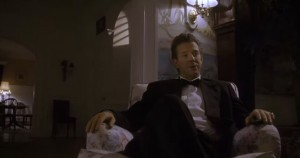 All this would be forgiven if the scenes between Rourke and the father, played by Anthony Hopkins, had the requisite intensity. Instead, the acting is all over the map; everyone at different tones, decibel levels, and styles (though everyone gets their turn to scream at their counterparts). The cast appears to be acting to a specific spot, like a mark on the floor, not each other and so these scenes are totally disjointed. It plays as if they are staring off into the distance and if they happen to catch the eyes of the other actors, great. And while casting Hopkins as a rich, cheating husband who is going through a mid-life crisis by philandering with women considerably younger than him is fine (he played the same role 10 years previous with Bo Derek in A Change of Seasons), Mimi Rogers, with her permanently gritted teeth and frigid, aloof expressions, has zero chemistry with Hopkins. They clearly were never a couple, and Hopkins pining after her is impossible to fathom; especially as they supposedly get closer together during the kidnapping and mind games. These mind games involve Rourke baiting Hopkins by attempting to show him how refined he is, and that just because he’s been in prison, doesn’t mean he lacks civility and charm. But because Rourke’s plan all along was to wait the entire situation out regardless, this just plays like time-wasting posturing.
All this would be forgiven if the scenes between Rourke and the father, played by Anthony Hopkins, had the requisite intensity. Instead, the acting is all over the map; everyone at different tones, decibel levels, and styles (though everyone gets their turn to scream at their counterparts). The cast appears to be acting to a specific spot, like a mark on the floor, not each other and so these scenes are totally disjointed. It plays as if they are staring off into the distance and if they happen to catch the eyes of the other actors, great. And while casting Hopkins as a rich, cheating husband who is going through a mid-life crisis by philandering with women considerably younger than him is fine (he played the same role 10 years previous with Bo Derek in A Change of Seasons), Mimi Rogers, with her permanently gritted teeth and frigid, aloof expressions, has zero chemistry with Hopkins. They clearly were never a couple, and Hopkins pining after her is impossible to fathom; especially as they supposedly get closer together during the kidnapping and mind games. These mind games involve Rourke baiting Hopkins by attempting to show him how refined he is, and that just because he’s been in prison, doesn’t mean he lacks civility and charm. But because Rourke’s plan all along was to wait the entire situation out regardless, this just plays like time-wasting posturing.
However, the best part of Cimino’s remake is Lindsay Crouse’s turn as an FBI agent (with a southern accent so awful that it must have been the inspiration for Kyra Sedg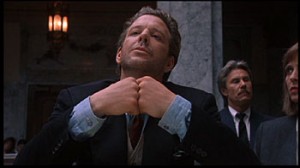 wick on The Closer) who is out to capture Rourke and the gang. Cementing her permanent identity as David Mamet’s ex-wife, she speaks in an odd, halting cadence (much like Mamet’s current wife, Rebecca Pidgeon does) and resembles what no law enforcer ever has (not that the FBI action in the movie avoids being unprofessional and abysmal). This further proves that Cimino doesn’t know anything about people, just technique.
wick on The Closer) who is out to capture Rourke and the gang. Cementing her permanent identity as David Mamet’s ex-wife, she speaks in an odd, halting cadence (much like Mamet’s current wife, Rebecca Pidgeon does) and resembles what no law enforcer ever has (not that the FBI action in the movie avoids being unprofessional and abysmal). This further proves that Cimino doesn’t know anything about people, just technique.
Cimino’s Desperate Hours feels like it was made by a robot, the supposed tension is an abstract idea of tension, the music is an idea of a score for a thriller (one minor musical tweak and this movie would actually be a comedy), and the pacing and editing have an idea of how events should follow each other, but not the reality. Reams of footage appear to have been deleted and the whole movie jumps around at random. As one of Rourke’s accomplices, David Morse has a whole section of the movie dedicated to him, a Western about open spaces, the beauty of the outdoors, helicopter chases, and how not to steal a jeep from two women in bikinis.
P.S. Cimino’s Desperate Hours is capped by a final shot where a helicopter passes a billboard ad, as the mountains and clouds bask in the background. What is this supposed to signify? Is this a statement about the beauties of nature being sullied by advertising (a world where Cimino famously originated from) and technology? That’s quite a message for something as unnecessary and gratuitous as a remake, especially one as awesomely insane as this one.




Stephen Ratcliffe says:
March 26th, 2018
9:37 am
The acting is ‘all over the map’. i love that comment, very well judged. It’s true though. Too many histrionics in some scenes. Mickey and Michael seem to fit well together as a team, alas they’ll never be in anyone else’s team!
Stephen Ratcliffe. 45, UK